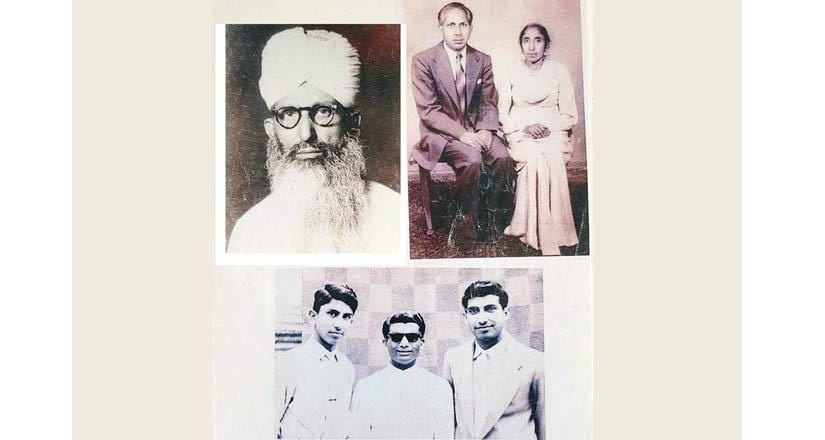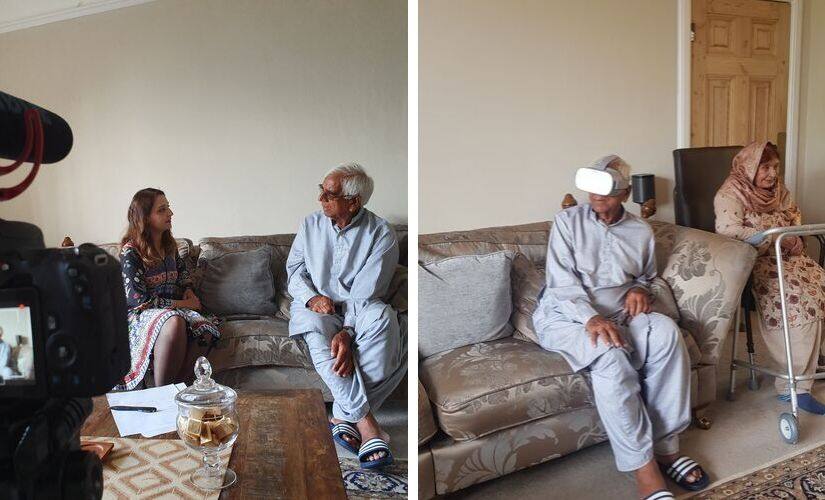“With all my love to my darling,” reads Dr Saida Siddiqui’s tiny handwriting in a letter dated 5 December, 1959. It is addressed to her husband, who was still in India when Saida had migrated from Lucknow to Karachi in Pakistan, back in 1957. Even though India had been partitioned, the dust was yet to settle. Years later, Siddiqui’s favourite memory from the time spent in Lucknow remains the city’s fabled baghs or gardens, and clandestine trips to the Taj Mahal with friends. Even though it has been six decades since she stood near it, she distinctly remembers the shiny fig tree in her yard and the pandit who used to sit there, distributing sweets to kids. Siddiqui now has the chance to revisit the city she calls home through Project Dastaan, an initiative led by a group of students at Oxford University, that uses virtual reality (VR) to reconnect Partition survivors with their childhood, heritage, and ancestry. [caption id=“attachment_7370921” align=“alignnone” width=“825”]  Dr Saida Siddiqui’s letter to her husband, excerpts from her diary[/caption] It was co-founder Sparsh Ahuja’s grandfather, whose pre-Partition memories set the pace for Project Dastaan — memories that also sparked bedtime stories of bucolic villages, where Muslims, Sikhs and Hindus cohabited in peace. Ahuja still sees his grandfather, Ishar Das Arora — a migrant from the small village of Bela in Pakistan — scribble Urdu poetry in a diary at his present home in Delhi. “There is an overwhelming feeling of lost identity that pulls him back to his West-Punjabi roots,” Ahuja reveals. In a different part of the world, Ameena Malak (co-founder) too would find her grandfather, Ahmed Rafiq, recall stories of stolen mangoes and roasted corn enjoyed in a field just outside his home in Hoshiarpur, India. This was before 1947, when all the boys of the neighbourhood would gather for an evening game of gulli-danda. And now, much like the scar on his thumb that Malak says he may have received during a game of kabaddi, everything else is only a reminder of a distant past. [caption id=“attachment_7370931” align=“alignnone” width=“825”]  A page from the diary of Khalid Bashir Khan Rai. In the picture (clockwise): Rai’s grandfather; uncle and aunt; Arif Lateef, Khalid and Rashid Lateef — cousins who migrated together between ages six and twelve.[/caption] However, when Malak and Ahuja’s paths crossed, they found purpose in a shared nostalgia. “When Sparsh and I first shared our grandparents’ Partition stories with each other, we were instantly surprised to see how similar they were, despite our grandparents making the opposite journey during Partition. There was definitely a different sense of peace and understanding between the people of the subcontinent then, which has been lost due to years of violence and politics,” Malak states. Now a six-member executive team that is officially affiliated with the contemporary South Asian studies programme at University of Oxford, Project Dastaan is working on its first flagship film, Child of Empire, an interactive virtual reality experience. One key character in Child of Empire is New Delhi’s Trilochan Singh, who migrated to India from a Sikh colony in Pakistan. Parts of his life, including the time he shared a cell with Mahatma Gandhi, will be documented in the film in an empathetic portrayal of life under colonial rule. The narrative of the film will unfold through a combination of animation, recreation of witness testimonies, and live action footage of the towns left behind by Partition survivors, as they stand today. Participants such as Malak and Ahuja’s grandfathers will be prompted to provide specific details — sounds, colours, textures — of their hometowns, which will then be turned into VR and 360-degree videos. The changes in the landscape from 1947 to now will remain a part of the cinematic experience, to emphasise on the impact Partition has had on generations that continue to live in its shadow. “There will be a disconnect between the memory of a place and its reality, and that conflict is part of the story,” says Saadia Gardezi. As tedious as the process sounds, it has taught the team the power of forgiveness and reconciliation. “It has been hugely rewarding to work with families who lost everything in the chaos of Partition, and yet still bear hope for the reconciliation of the two nations. Their stories contain the best and worst of human nature,” says Sam Dalrymple, one of the project leaders. Interacting with people affected by an event like Partition that resulted in unspeakable losses of life, property, and culture, has also made the team aware of the ways in which trauma may manifest. “There is a fine line between nostalgia and heartbreak, and this project walks on it,” Saadia adds. The mentors at Project Dastaan are a formidable panel of historians, educationists, and activists, with names like Gabo Arora, Aanchal Malhotra, Anam Zakaria, and William Dalrymple associated with the initiative in different capacities. Even though Partition has been amply depicted in mainstream media, the founders of the project believe that in the public discourse, the politics of the event often overshadows its socio-cultural ramifications. “What is lacking is honest, authentic discussion that doesn’t rely on state driven narratives. Communal violence is not endemic to the subcontinent in the same way that sectarian violence is not endemic to the Middle East,” states Ahuja. The project and the film aim to address a “lack of cultural exchange”, which has resulted in pervasive misconceptions. “Unlike other films about Partition, where one party is often vilified, we want to show that no one was without blame, as ultimately people from all sides caved into fear and hate. Our differences that are still at play today do not, and should not, come down to our religious beliefs,” says Malak. [caption id=“attachment_7371301” align=“alignnone” width=“825”]  Bahadur Ali Pambra and Jannat Bibi use the VR headset.[/caption] Over seven people have been interviewed for the project so far, most of whom were discovered through the members’ social networks. The team is due to fly to both India and Pakistan to collect footage and film Child of Empire. The group believes that the stories must be documented for posterity, and in order to facilitate that, Project Dastaan wishes to travel to film festivals, in an attempt to show the cost at which our homes were built and kept.
Project Dastaan, an initiative led by a group of students at Oxford University, seeks to use virtual reality (VR) to reconnect Partition survivors with their childhood, heritage, and ancestry.
Advertisement
End of Article


)
)
)
)
)
)
)
)
)



